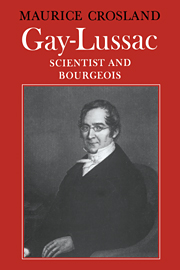Book contents
- Frontmatter
- Contents
- Preface
- Chronological table
- List of abbreviations
- 1 A young provincial in Paris
- 2 The apprentice of Arcueil
- 3 Personal influences and the search for laws
- 4 Collaboration and rivalry
- 5 The volumetric approach
- 6 Scientific research
- 7 Professor, Academician and editor
- 8 A scientist in the service of government and industry
- 9 A new technique and the dissemination of technical information
- 10 Scientist and bourgeois in the political arena
- 11 The legacy
- Appendix: select correspondence
- Notes
- Select bibliography
- Name index
- Subject index
1 - A young provincial in Paris
Published online by Cambridge University Press: 03 November 2009
- Frontmatter
- Contents
- Preface
- Chronological table
- List of abbreviations
- 1 A young provincial in Paris
- 2 The apprentice of Arcueil
- 3 Personal influences and the search for laws
- 4 Collaboration and rivalry
- 5 The volumetric approach
- 6 Scientific research
- 7 Professor, Academician and editor
- 8 A scientist in the service of government and industry
- 9 A new technique and the dissemination of technical information
- 10 Scientist and bourgeois in the political arena
- 11 The legacy
- Appendix: select correspondence
- Notes
- Select bibliography
- Name index
- Subject index
Summary
‘I have not chosen a career which will lead me to a great fortune, but that is not my principal ambition’
Gay-LussacIntroduction
By the late eighteenth century science was fairly well established as an intellectual activity in western Europe. The scientific movement had reached a zenith with the work of Isaac Newton (d. 1727) who had applied his mechanics to the whole solar system in his law of universal gravitation. Among the many followers of Newton in Britain in the eighteenth century, specially distinguished for their studies of the nature of matter were Joseph Black, Henry Cavendish and Joseph Priestley. Each in turn made important contributions to the knowledge of ‘airs’ or gases, but the interpretation of the role of gases in the physical and chemical world had to wait for the Frenchman, Antoine Laurent Lavoisier (1743–1794). France was not only Britain's political rival in the eighteenth century but also shared with her supreme honours in literature, the arts and sciences. With a population of over twenty million, France had a major advantage over Britain with less than half that estimated number. But several factors encouraged the beginnings of an industrial and economic revolution in Britain, while France, with her government-regulated industry and more rigid social stratification, carried on the traditional methods of manufacture and production.
- Type
- Chapter
- Information
- Gay-LussacScientist and Bourgeois, pp. 1 - 20Publisher: Cambridge University PressPrint publication year: 1978



